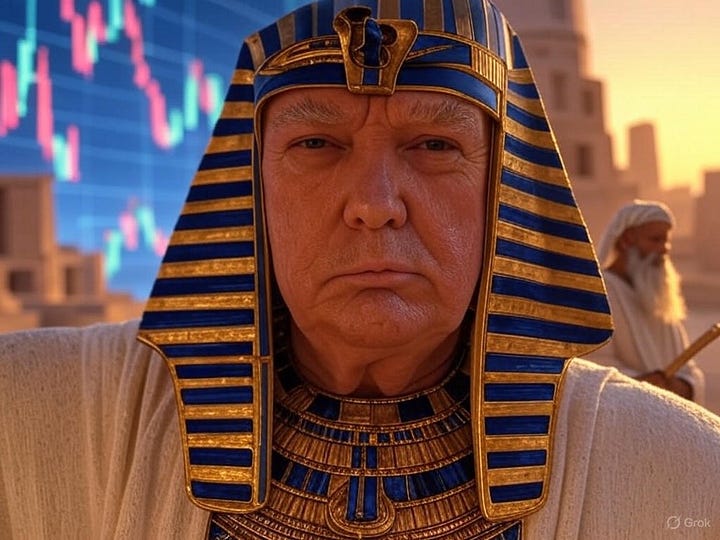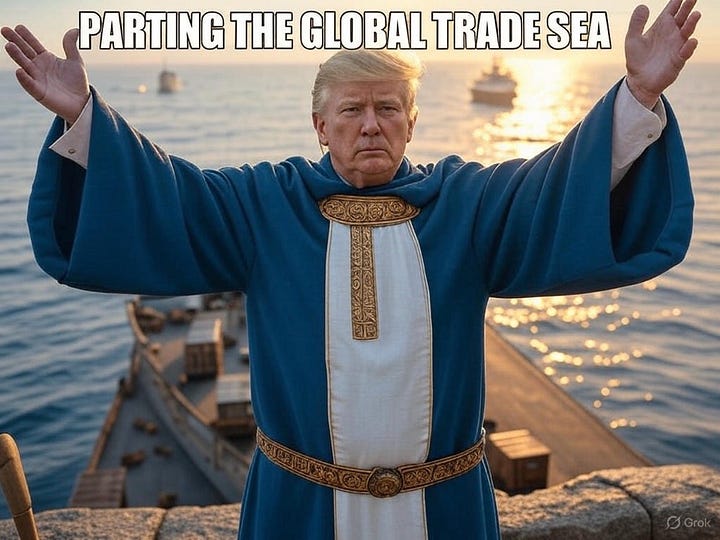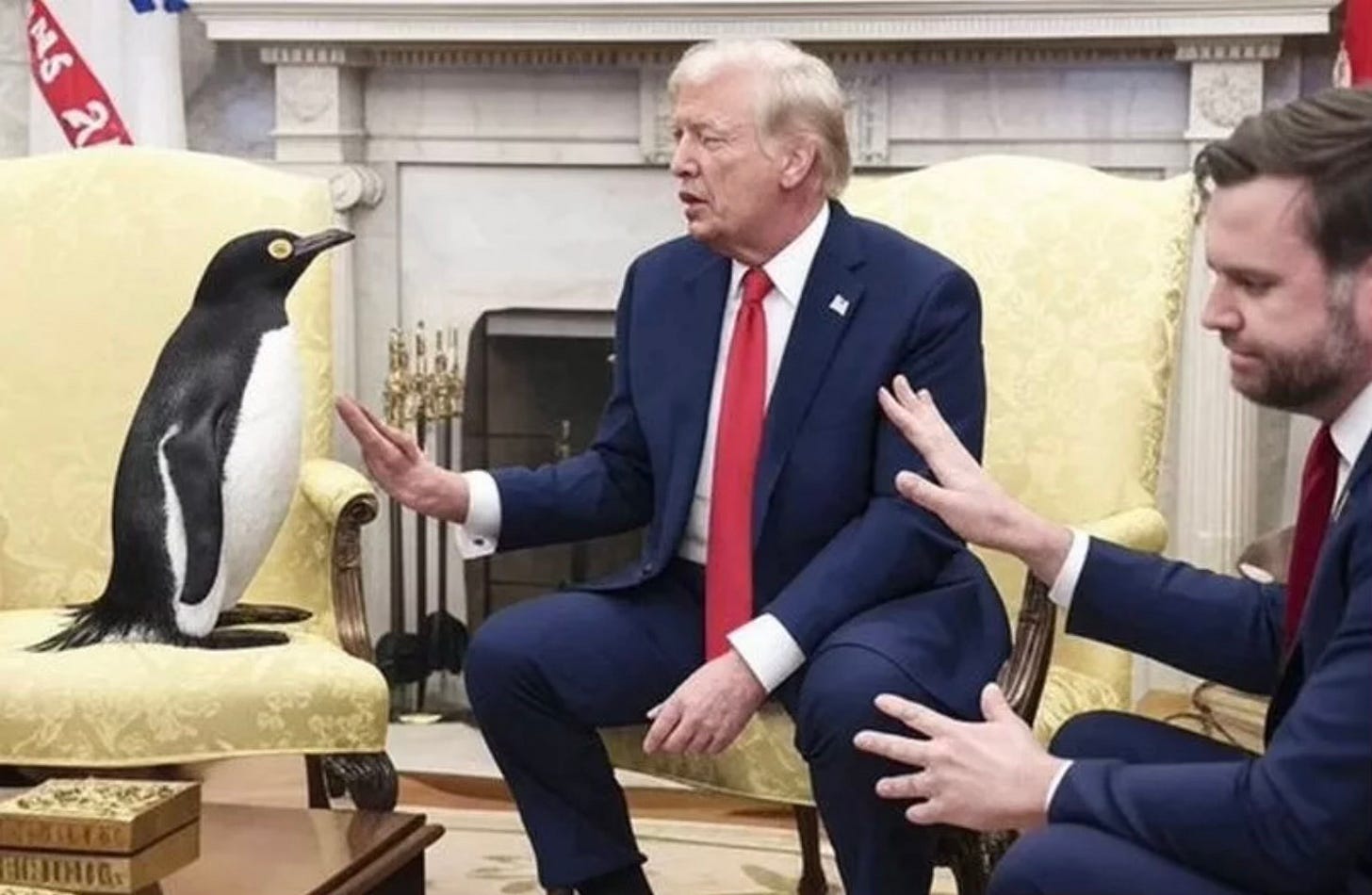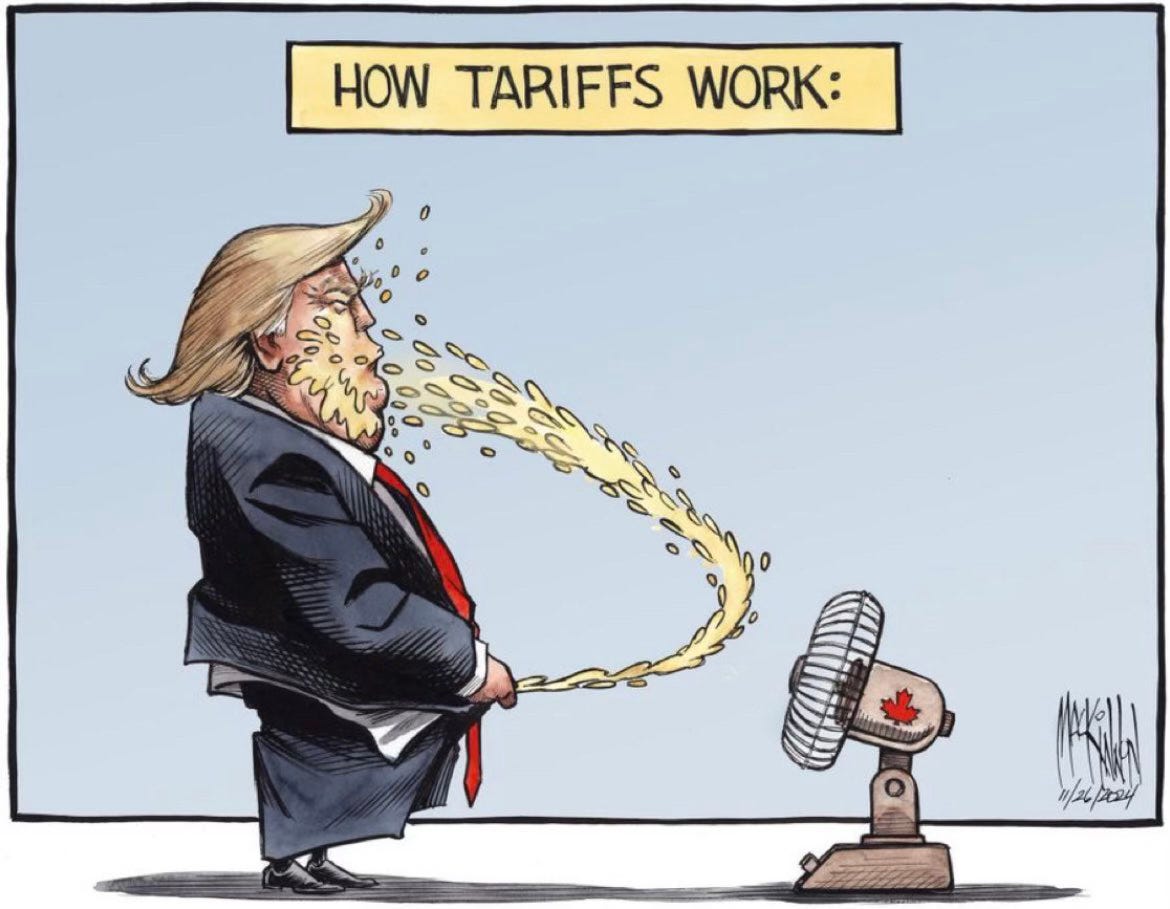From Tariffmageddon to the Promised Land? A Tale of Two Stories
Is Donald Trump a tariff tyrant or a contemporary Moses – leading the world to a fairer trade system, and Americans to a better dream “somewhere over the rainbow”?


The Post I Need to Postpone…
“If I had more time, I would have written a shorter letter.” —Mark Twain
That’s why I’m taking my time with a post I’ve been writing about President Trump’s April 2nd “Liberation Day” announcement. As the dramatic consequences unfold, it’s shaping up to be one of the most consequential stories of our time. Amid roiling markets and rapid-fire news—including Trump’s own pause to Think Again about the most punishing reciprocal tariffs—my mind has whipsawed between whether we’re living through “Tariffmageddon” or “Deal-a-Rama,” a crisis or an opportunity.
But another liberation story of immense consequence—the Exodus—calls me to turn my time and attention to its retelling this weekend. So this post is both a pause and a preview: a glimpse of the deeper analysis to come, and a reflection on the Passover and Easter season we’re entering—a time to celebrate freedom, renewal, and the enduring power of story to inspire our better angels.
A Dialogue That Made Me Think Again
Shortly after “Liberation Day,” my friend Glenn Beaton – author of the witty Substack The Aspen beat – published a post defending Trump’s tariff strategy: The tariffs are a needed blow to the ‘progressive’ tax system.
While Glenn’s post focused on how tariffs could replace our broken tax system, I was concerned with the broader picture: the rollout, the perception of American exceptionalism, and what this meant for the American Dream.
So, I jumped into the comments. What followed was an illuminating exchange. I challenged Glenn’s optimism:
Yes, it’s true that the international trade system is not currently free. We’re all for free trade as long as it is fair trade, so go after the worst trade protectionists to make trade more free and fair. However, this universal tariff policy seems arbitrary and irrational. Isn’t that unfair?
….If the world perceives the US as arbitrary and punitive rather than principled and predictable, doesn’t that diminish the cultural influence and soft power that sets us apart? If allies turn elsewhere, such as China or regional trade blocs, won’t we lose the exceptional role we’ve played as the global economic leader? And if Americans who voted for inflation relief and economic prosperity feel betrayed, won’t they be disillusioned and resentful?
…How can we be a beacon of prosperity if we’re depleting the wealth of our nation (GDP is now projected to decline), businesses, 401ks, and individual standards of living?
Glenn challenged my assumptions:
To the extent Trump has started a trade war, it appears that he's already won it….
…Trump is a good negotiator (and perhaps as unlikeable sometimes as one). Now he has the other countries in the position of negotiating against themselves while he pretends not to even want a deal. But I think he does want a deal -- he's the guy who wrote the book, right?
If there's no deal, we can live with that too. The American Dream is not all about cheap stuff.
After reflecting on our dialogue, I realized that while I still have serious concerns about the madness to the method, Glenn had a point about the Art of the Deal. There’s a lot more going on than I first understood. Given the immense consequences, we all should examine the facts and arguments we may have overlooked.
I encourage you to read the full exchange here, as we wrestle with whether Trump’s tariff gambit is a sign of strength, or a threat to America’s moral and economic leadership.
The Influencers: Two Economic Giants Who Shaped My Thinking
My approach to engaging with Glenn was informed not just by my economics and finance background, but by two legendary free-market economists: Thomas Sowell and Milton Friedman.
Thomas Sowell, renowned for his maxim, “There are no solutions; there are only trade-offs,” has long been skeptical of tariffs. While they may be politically appealing, he contends they usually lead to inflation, provoke retaliation, and ultimately harm the very people they’re intended to help.
After Trump’s tariff announcement, I discovered this interview with Sowell, now 94 years old and still sharp. Watch here:
Here’s an excerpt from the interview:
"It's painful to see what a ruinous decision from back in the 1920s being repeated. Now insofar as he's using these tariffs to get various strategic things settled and he's satisfied with that…but if you set off a worldwide trade war, that has a devastating history. Everybody loses, because everybody follows suit, and all that happens is you get a great reduction in international trade."
"It's disturbing in another sense. Franklin D. Roosevelt, when he was president in the 1930s, said that you have to try things, and if they don't work, then you admit it, you abandon that, and you go on to something else, and you try that until you come across something that does work."
"Now, that's not a bad approach if you are operating within a known system of rules. If you are the one who's making the rules, then all the other people have no idea what you're going to do next. And that is a formula for having people hang on to their money until they figure out what you're going to do, and when a lot of people hang on to their money, you can get results such as you got during the Great Depression of the 1930s."
Milton Friedman’s iconic video “I, Pencil” describes the miracle of the free market.
Friedman explains how a simple pencil results from global cooperation—no single person can make one, yet the free market delivers it affordably and efficiently.
You can watch it here:
Together, these two ideas – beware of top-down economic interventions and trust in the inherent genius of markets –shaped my skepticism of Trump’s tariff policy. They still resonate.
As did this meme:
But as John Stuart Mill reminds us, he who knows only his own side of the case knows little of that.
And so, I sought out other perspectives.
This interview of Batya Unger-Sargon helped me see tariffs as a moral response to the elite-driven decline of America’s working class. Watch here:
Here’s an excerpt:
BATYA UNGAR-SARGON: You know, back in the 1970s, the largest share of the wealth in this country was held by the middle class. That is how you have a stable democracy.
That is how you have prosperity for all. That is the idea that this country was founded on, that if you work hard, you should have access to the American dream. And that was inextricably linked to the fact that 25% of the economy was in manufacturing.
It was the largest share of the economy. Manufacturing pays good jobs, good wages, good conditions, where people who work really hard can expect to own a home and retire in dignity.
Today, the largest share of the economy is in finance and real estate. And that middle class has been totally squeezed to where working-class Americans, the hardest working Americans, can no longer expect to be able to afford the American dream despite working so hard. And what Donald Trump is doing is he … has taken on the entire international global order.
He is waging war on behalf of the forgotten men and women of the heartland of this country and saying, no longer will they be downwardly mobile and committing suicide and dying of fentanyl overdoses because they've been left out of the immense prosperity that this country has generated.
As I continued weighing whether Trump’s tariff strategy was method or madness, I found this interview with Chamath Palihapitiya— venture capitalist and co-host of the All-In podcast. In an excerpt below, Chamath argues the goal is to close loopholes, reset global trade rules, and end unfair burdens on U.S. taxpayers.
Responding to criticism about tariffs on countries with no people or only penguins, Chamath explains how these places have been used as loophole havens, allowing goods from China to be rerouted to avoid tariffs before entering the U.S.
He contends that the goal is to prevent the evasions that undermined past trade crackdowns, thereby resetting the rules of global trade and fixing the imbalance that taxes Americans while others benefit.
“If we were just starting this club in 2025,” he asks, “what would the rules of membership be?”
That question resonated, considering I worked at the International Finance Corporation, private-sector affiliate of the World Bank. Frankly, not much development has happened in the developing world since. So, shouldn’t we re-evaluate the performance and accountability of global institutions we fund disproportionately – the World Trade Organization, the World Bank, International Monetary Fund, World Health Organization, United Nations, NATO?
From Memes to Meaning: The Battle Over the Liberation Day Narrative
As modern-day hieroglyphics, memes compress worldviews into instant visuals, shaping how we think of and remember events. As we live through the first draft of Liberation Day history, these memes are battling to control the narrative:
The anti-tariff memes are powerful:
The pro-tariff response also resonates:
This is a 4-second video:
And the meme I created on Grok. Do you like it?
Which memes do you find persuasive?
The truth is, common sense is on all sides of this debate. Time will tell which memes predict how we’ll remember Liberation Day. Is Trump a tariff tyrant or a modern-day Moses? A self-sabotaging protectionist or a liberator leading America out of economic bondage?
As I explore these questions, I pray for divine inspiration—and hopefully less than 40 years of wandering in a thought desert—to arrive at some conclusions!
From Liberation Day to the Exodus: Stories to Burnish the American Dream
As we turn to celebrating Passover and Easter, it’s worth noting that the Exodus story isn’t merely a biblical passage; it’s one of the most consequential narratives in human history. Its echoes inspired countless generations to believe that freedom is a right worth fighting for and that the human spirit can overcome even the most insurmountable odds.
When America’s founders crafted a nation rooted in liberty and justice, they drew inspiration from the story of Moses leading the Israelites out of slavery. Thomas Jefferson even proposed a national seal depicting Moses parting the Red Sea.
Frederick Douglass cited Moses as the model for the abolition of slavery, and Abraham Lincoln was remembered as “the American Moses.” On the eve of his assassination, Martin Luther King Jr. declared, “I’ve been to the mountaintop… and I’ve seen the Promised Land.”
From the spirituals sung by enslaved African Americans – “Go Down, Moses”—to modern human rights movements, the Exodus remains a powerful symbol of hope, courage, and deliverance.
That same legacy of liberation also inspired two young immigrants fleeing Eastern Europe. From that yearning to finally be free emerged the iconic song “Somewhere Over the Rainbow.” You too will be inspired by this video of Broadway stars Ben Platt and Judith Light telling the poignant backstory behind this timeless American masterpiece. America is still a Promised Land – a place where bluebirds sing and where dreams and dignity can both flourish.
In uncertain times, we all need stories of hope and renewal.
My hope springs eternal, especially during this season of Passover and Easter, both celebrations of liberation, transformation and love. This holiday, whether we gather with loved ones around a Seder table or an Easter feast, may we reflect on the enduring stories that call us to be better.
In that spirit, I hope you’ll look more deeply into the arguments surrounding Trump’s tariff policy. Maybe you’ll even share them in the comments to continue the dialogue Glenn and I began last week!
After all, we are a nation founded on a liberating idea: a government of, by, and for the people.
So, this holiday, I invite you to Think Again. Who knows? You just might change your mind.








A characteristically thoughtful, balanced discussion, Melanie. Your background in finance dwarfs mine, so I’ll dare to say only that I share Batya’s view of the matter: had I not been fortunate enough to get on the middle-class real estate escalator over 40 years ago, starting with a $39,000 house in Idaho, I’d have very few assets in my old age that might hold their value. As you probably recall, I was a Pat Buchanan / Donald Trump anti-globalist populist at the time we met, focused far more on cultural issues than economic ones, so from every perspective I embrace the “Liberation Day” theme. Trump is endeavoring not so much as to take us to The Promised Land as to RETURN us to the one that has been gradually, steadily stolen from the forgotten man. The “tyrant” characterization has always struck as simply wrong; if this were 17th-century England, he might have become an Oliver Cromwell, but in this American republic, he’s less of a tyrant than Abraham Lincoln proved to be in many respects.
Anyway, thanks for your open mindedness. We don’t need more “Panicans” 😆.